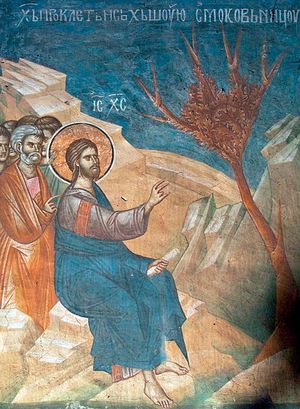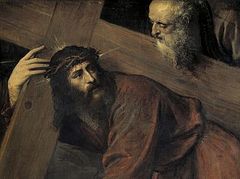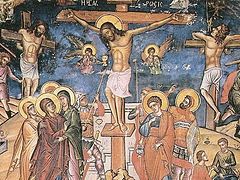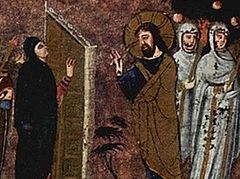 In the name of the Father, and of the Son, and of the Holy Spirit!
In the name of the Father, and of the Son, and of the Holy Spirit!
Today—Holy Monday—we celebrate one of the most paradoxical services. We remember the Savior’s unusual miracle—the cursing of the barren fig tree, and we also celebrate the memory of Blessed Joseph, the son of the Old Testament Patriarch Jacob.
Following the Synaxarion entry for today, Joseph served as a type of Jesus Christ. Because of the jealousy of his brothers, Joseph was sold to foreigners. He was imprisoned in a dark ditch, but was then miraculously liberated and placed at the right hand of the king over Egypt. During the famine, he sold wheat to all who came to him. The Righteous Joseph fled from the raging woman who wanted to drag him to his doom with serpentine slander. He endured suffering for his chastity. The chaste Joseph was a prefiguration of the innocent Christ.
Because of the envy of the Jews, Jesus was given over to the judgment of the foreigner Pilate. He was placed for a time in a dark tomb, but afterwards He sat at the right hand of the Father over the entire world. Christ gives the Bread of Life to all who come to Him. The devil-serpent was hot on His heels on this Earth. And although Jesus did no harm to anyone, He endured death upon the Cross for the many. Christ was greater than Joseph because He endured His sufferings voluntarily.
One day the Lord began His path to His voluntary sufferings. He was met with illusory exultation: “Hosanna in the highest!” But what did He find in the people? A barren fig tree.
According to the traditional interpretation, the barren fig tree symbolizes the Jewish people who did not give God the expected fruits. However, the Synaxarion for today offers other interpretations. Christ showed by the example of the tree that He has the power not only to do good, but also to severely punish. As the good God, He doesn’t want to reveal the coming torments to ungrateful people by the example of some person, therefore He uses a soulless tree. On the other hand, the fig tree is not just the Jews, but also every soul that does not bear spiritual fruit. The Lord comes to it in the morning, that is, after the end of the day of this life, and if He finds no fruit in the soul, He withers it with a curse, that is, He sends it to the fire for eternal torment.
What should a man do so his soul won’t be cursed like the barren fig tree? The Fathers who composed the Divine services of Holy Monday advise us to avoid sin, like the Righteous Joseph, and to hearken unto Christ, as did the Apostles.
St. Kosmas of Maiuma carries the Gospel from antiquity to modernity: “Then shall all men know that ye are My disciples, if ye keep My commandments… Be at peace with one another and with all men; think humbly of yourselves and ye shall be exalted… He therefore who would be the first among you, let him be the last of all.”1 St. Andrew of Crete offers not only to the Apostles, but also to us: “Cleaving to the Lord … let us prepare ourselves for spitting, mockery, and disgrace, that, remaining faithful to Him in His holy Passion, we may be glorified with Him.”2
The liturgical stichera speak about how we need to mortify ourselves to worldly sweetness for the sake of Christ, following Him and being crucified, being “purified in mind.”3
The Divine services offer us this “purification of mind” today. They transmit the images of the historical events of the Sacred Scriptures to every person standing in church. And this transmission of meanings enlivens the Divine history. We already look at the Gospel not as a source for Biblical archaeology, but as the book of life, because everything said there is relevant for us here and now. Love and punishment from the Lord are immutable both then and now. Therefore we, brothers, as is sung in the stichera, fearing the punishment of the fig tree for barrenness, must bring Christ “fruits worthy of repentance.”4
Today’s service is a masterpiece of Patristic theology. “If you are a theologian, you will pray truly,” remarked Evagrios of Pontus, “And if you pray truly, you are a theologian.”5 Theology, says St. Diadochos of Photiki, “gives the soul the greatest of gifts … uniting it with God in undivided communion.”6 “There is no true theology that is not part of an act of worship,” says Metropolitan Kallistos Ware. “All authentic theology is liturgical, doxological, mystical.”7 At the same time, theology is not a form of intellectual thought, but a way of life—the mind oriented on the transfiguration of the soul. There can be no true theology without the personal aspiration to holiness. Evagrius of Pontus emphasized this, comparing theologians with the Evangelist John at the Mystical Supper: “The breast of the Lord is the knowledge of God; whoever reclines upon it will be a theologian.”8
In these and other words, we see that the Church’s interpreters depart from the letter of Scripture, elevating us to the spirit. What does it benefit us to know how dreams were interpreted in the time of the Righteous Joseph? What use is it for us to know why the Lord cursed precisely the fig tree? But these stories become fundamentally important for us if we’re talking about our own immortal soul: Will it go to Heaven or hell?
The Divine service for today gives an actualized answer to this question. It announces the events of the Gospel, but the Gospel makes it part of our common prayer. At the same time, the boundaries of time are blurred and historical literalism loses its importance. What matters is not the money for which Joseph was sold into slavery, but that his brothers sold him out of envy. What’s important is not that the Lord cursed the fig tree, but that He can cast our barren soul into the fire.
Bearing this in mind, brothers, let us be vigilant. Let us not sleep, be bored, or chat during the services. Lo, the Bridegroom is already at the door. He knocks at the door of our soul, seeking a place in the abode of our heart. Do we have a supply of the oil of virtue? Or will He find us sleeping? Let us pay heed to the text of the Divine service, so as not to wither like the barren fig tree; let us strive to become true theologians-men of prayer. For “he who prays purely,” St. Silouan the Athonite loved to repeat, “is a theologian.”
Through the prayers of the Righteous Joseph, O Christ God, have mercy upon us!
Amen.



